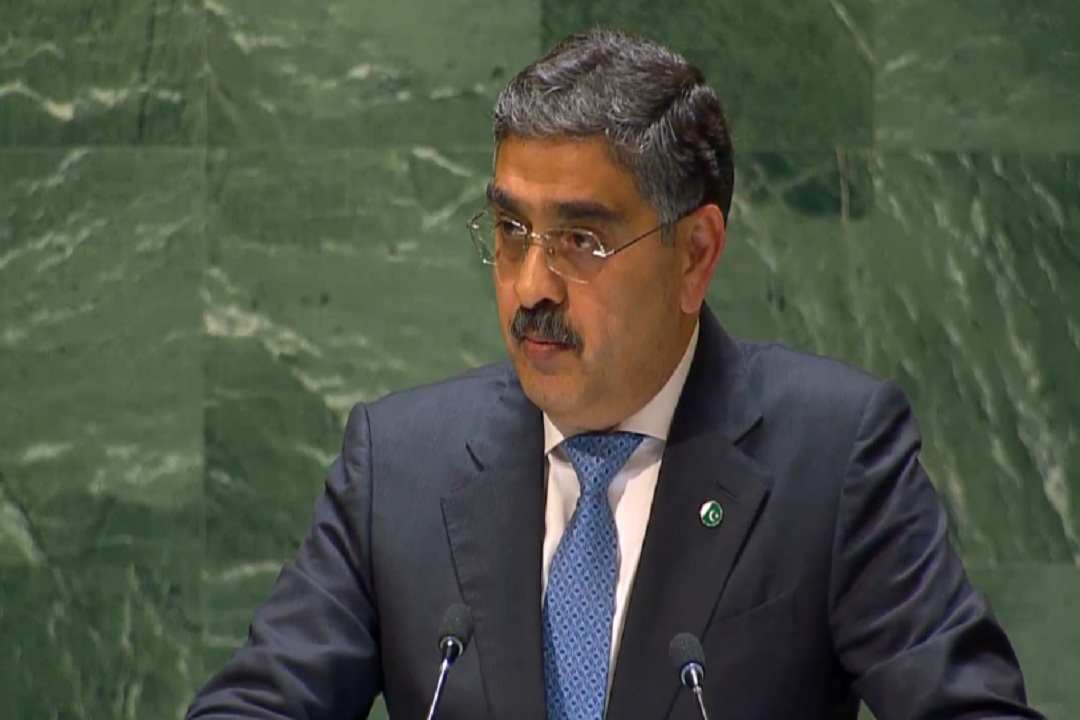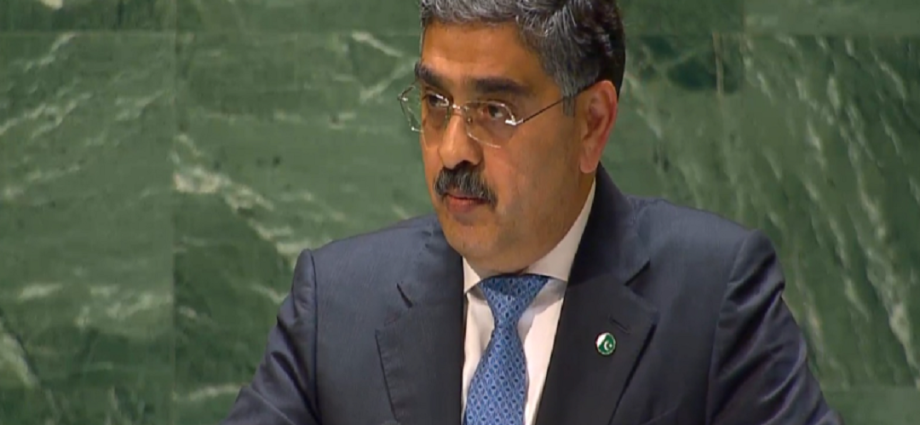
Kashmir key to India-Pakistan peace, says PM Kakar, urges UN resolutions’ implementation
“Make no mistake,” the Pakistani leader said, “it is a latent threat that undermines millennia of progress.
PM Kakar also focused on a range of issues, including the cross-border terrorist attacks against Pakistan by Afghanistan-based TTP;
The threat posed by far-right groups like Hindutva-inspired extremists; Islamophobia; global economic crises stemming from Covid.
UNITED NATIONS ( Web News )
Caretaker Prime Minister Anwaar-ul-Haq Kakar Friday called on the UN Security Council (UNSC) to secure the implementation of its resolutions on Kashmir, which, he said, was the key to peace between Pakistan and India.
“India has evaded implementation of the Security Council’s resolutions which call for the ‘final disposition’ of Jammu and Kashmir to be decided by its people through UN-supervised plebiscite,” he told the UN General Assembly in its iconic hall with several world leaders, top diplomats and officials in the audience.
In his maiden address to the 193-member Assembly’s high-level session, PM Kakar also focused on a range of issues, including the cross-border terrorist attacks against Pakistan by Afghanistan-based TTP; the Palestine tragedy; the threat posed by far-right groups like Hindutva-inspired extremists; Islamophobia; global economic crises stemming from Covid, conflict and climate change; Sustainable Development Goals (SDGs), Pakistan’s efforts to recover from its economic challenges, and the UNSC reform.

“Development depends on peace,” the prime minister said, adding, “Pakistan desires peaceful and productive relations with all our neighbours, including India.”
Since August 5, 2019, PM Kakar said India, with 900,000 troops in the occupied Kashmir, imposed extended lockdowns and curfews; jailed all the genuine Kashmir leaders; violently suppressed peaceful protests; resorted to extra-judicial killings of innocent Kashmiris in fake “encounters” and so-called “cordon and search operations”, and imposed collective punishments, destroying entire villages.
“Access to occupied Kashmir, demanded by the UN High Commission for Human Rights and over a dozen Special Rapporteurs, has been denied by New Delhi,” he told delegates from around the world.
In this regard, the prime minister called for the reinforcement of the UN Military Observer Group for India and Pakistan (UNMOGIP), stressing that global powers should convince New Delhi to accept Pakistan’s offer of mutual restraint on strategic and conventional weapons.
Pakistan, he said, shared the concerns of international community with respect to Afghanistan, its first priority being to prevent and counter all terrorism from and within that neighbouring country.
“Yet,” the prime minister said, “we advocate continued humanitarian assistance to a destitute Afghan population in which Afghan girls and women are the most vulnerable; as well as revival of the Afghan economy and implementation of the connectivity projects with Central Asia.
“Pakistan condemns the cross- border terrorist attacks against Pakistan by the TTP, Da’esh and other groups operating from Afghanistan,” the prime minister said, adding, “We have sought Kabul’s support and cooperation to prevent these attacks. However, we are also taking necessary measures to end this externally encouraged terrorism.”
He told the international community that Pakistan’s government was committed to rapid economic recovery — stabilize its foreign exchange reserves and currency; expand domestic revenues and mobilize significant domestic and external investment.
To that end, he said, Pakistan had established a Special Investment Facilitation Council (SIFC) to expedite investment decisions, with 28 projects identified in priority sectors – agriculture, mining, energy and IT – for implementation in collaboration with the country’s partners.
The second phase of the China-Pakistan Economic Corridor (CPEC), he said, had been initiated covering railway, infrastructure and manufacturing projects.
Noting the far-reaching commitments made at the SDG summit to implement the 17 anti-poverty goals, he called for ensuing implementation of the “SDG Stimulus”; the re-channelling of unused Special Drawing Rights (SDRs) for development; the expansion of concessional lending by the multilateral development banks; and the resolution of the debt problems of the 59 countries in debt distress.
Pakistan, he added, also looked forward to the fulfillment of the climate change commitments made at COP28 by the developed world: to provide over $100 billion in annual climate finance; allocate at least half of such finance for adaptation in developing countries; operationalize the Fund and funding arrangements for Loss and Damage; and accelerate their carbon emission mitigation targets to “keep alive” the goal of restricting global warming to 1.5 degrees centigrade.
Pointing out that Pakistan is one of the countries worst affected by climate change, the prime minister said that the epic last summer’s floods submerged a third of the country, killed 1700 and displaced over 8 million people, destroyed vital infrastructure and caused over $30 billion in damage to its economy.
Gratified by the commitments of over $10.5 billion for Pakistan’s comprehensive plan for recovery, rehabilitation and reconstruction with resilience – the 4RF Plan – at the Geneva Conference last January, he said that specific projects were being submitted to ensure it timely funding and execution. “I hope our development partners will accord priority to release of funds for our ‘resilient’ recovery plan which has been costed at $13 billion.”
he prime minister welcomed the normalization of Saudi-Iranian ties, but expressed dismay over the continuing tragedy of Palestine, with Israeli military raids, airstrikes, expansion of settlements and evictions of Palestinians.
“Durable peace can be established only through a two-state solution and the establishment of a viable and contiguous Palestinian State within the pre-June 1967 borders, with Al-Quds Al-Sharif as its capital.”
He called for countering all terrorists without discrimination, including the rising threat posed by far-right extremist and fascist groups, such as Hindutva-inspired extremists threatening genocide against India’s Muslims and Christians.
“We also need to oppose ‘state terrorism’; address the root causes of terrorism, such as poverty, injustice and foreign occupation; and distinguish genuine freedom struggles from terrorism.”
“Make no mistake,” the Pakistani leader said, “it is a latent threat that undermines millennia of progress. We need to cherish and celebrate our diversity and different ways of life. Mutual respect, sanctity of religious symbols, scriptures and personages should be ensured.”
In this regard, he added, “While Islamophobia is an age-old phenomenon; however, after the 9/11 terrorist attacks, it has assumed epidemic proportions, as manifested in the negative profiling of Muslims; and attacks on Islamic sites and symbols, such as the recent public burnings of the Holy Quran.”
On UNSC reform, PM Kakar said Pakistan did not believe in elitism within the comity of nations. Pakistan, he said, believed that adding additional permanent members — India is one of the aspirants — to the Security Council would further erode its credibility and legitimacy.
“The widest possible agreement can be best achieved on the basis of the Uniting for Consensus Group’s proposal for expansion of the Council only in the non-permanent category with provision for a limited number of longer-term seats,” he said.
“Pakistan believes that to build, preserve and promote peace and prosperity today, and in the future, it is vital to reduce great power rivalry and tensions; ensure strict adherence to the UN Charter; consistently implement Security Council resolutions; eliminate the root causes of conflicts; and respect the principles of non-use of force; self-determination; sovereignty and territorial integrity; non-interference in the internal affairs of states and peaceful co-existence.”

